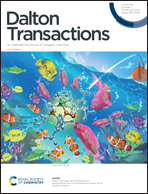Enhancing CO2/N2 and CH4/N2 separation performance by salt-modified aluminum-based metal–organic frameworks†
Abstract
The energy-saving separation of CO2/N2 and CH4/N2 in the energy industry facilitates the reduction of greenhouse gas emissions and replenishes energy resources, but is a challenging separation process. The trade-off between adsorption capacity and selectivity of the adsorbents is one of the key bottlenecks in adsorption separation technologies’ large-scale application in the above separation task. Herein, we introduced a series of fluoroborate or fluorosilicate salts (Cu(BF4)2, Zn(BF4)2 and ZnSiF6) into the open coordination nitrogen sites of aluminum-based metal–organic frameworks (MOF-253) to create multiple binding sites to simultaneously enhance the adsorption capacity and selectivity for the target gas. By the synergistic adsorption effect of metal ions (Cu2+ or Zn2+) and fluorinated anions (BF4− or (SiF6)2−), the single-component adsorption capacity and selectivity of salt-modified MOF-253 (MOF-253@Cu(BF4)2, MOF-253@Zn(BF4)2 and MOF-253@ZnSiF6) for CO2 and CH4 were effectively improved when compared to pristine MOF-253 at 298 K and 1 bar. In addition, the salt-modified MOF-253 has a moderate adsorption heat (<30 kJ mol−1) which could be rapidly regenerated at low energy by evacuation desorption. As confirmed by the ambient breakthrough experiments of MOF-253 and MOF-253@ZnSiF6, the real separation performance for both CO2/N2 (1/4) and CH4/N2 (1/4) was obviously improved. This work provides a feasible post-modification strategy on uncoordinated sites of the framework to improve adsorption separation performance and promote the development of ideal adsorbents with a view to realizing their application in the energy industry.



 Please wait while we load your content...
Please wait while we load your content...